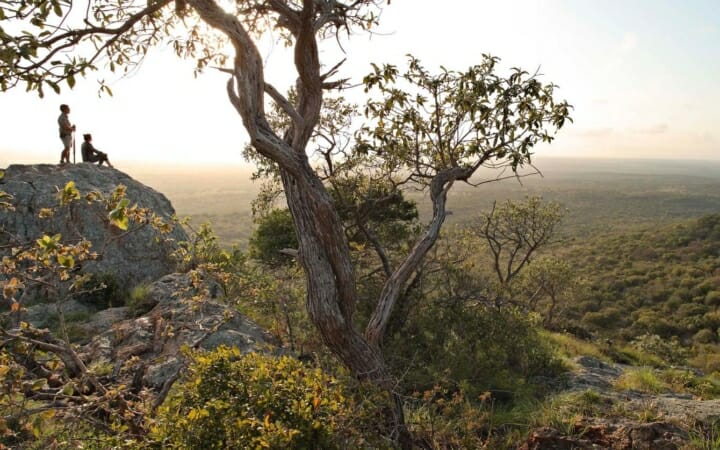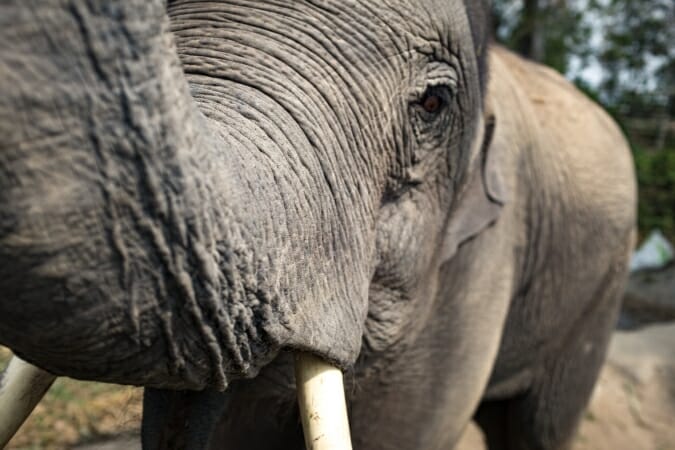Gap in the Market Volume 12 - Safari Travel
We're back with another instalment of our popular 'Gap in the Market' series. Each volume addresses a different travel industry niche, as we do our best to bring you insight and inspiration from leading figures who have been there and done it. This week we're taking a walk on the wild side, delving into the world of safari travel and getting to grips with a travel niche that's been around for longer than many of its contemporaries.
Although safaris are available all around the world with all sorts of wildlife as the focus, we'll be concentrating on the original, ever-present and booming African safari scene. As the renowned home of the safari, the tourism scene in Africa heavily relies upon wildlife and a community of travellers who are passionate about the natural world.
Safari Represents Everything We Love About Travel
If for some reason you are unfamiliar with the world of safari travel, let's quickly explain it before we go any further. A safari is a journey, typically taken in Africa, that takes you through the wild to experience the natural world in all its glory. In years gone by safaris went hand in hand with hunting for big game. But now, with poaching largely illegal and conservation at the forefront of people's minds, a safari is now about observation and appreciation.
More than anything, safaris are a celebration of the natural world and a way for people to witness first hand what they might have seen on TV or in wildlife documentaries. Thrilling, educational and inspiring in equal measure, safaris represent everything we love about travel. A safari is the epitome of getting out there and experiencing something new, of satisfying the innate curiosity that we all hold about lands far away.
How the Safari Market is Shaping Up
If we look at global travel industry trends, the conditions are perfect for a booming safari sector: a rise in disposable income; cheaper air fares; an increase in demand for more 'genuine' trips; the growing influence of social media. Although there isn't much data as we would like available on the numbers of tourists visiting African destinations year on year, the safari trend appears to be a positive one.
To take an example from one or two countries, Travel Market Report states that: "The Kenya Tourism Board reports that 730,000 people visited the country in the first nine months of 2016, up 16% from the same period in 2015, with American tourists making up the fastest-growing large market. Other popular African countries, like South Africa, report similar growth."
This growth is largely down to an increased demand for 'experiential' travel among all demographics. The name is the giveaway - experiential travel is all about the experience, it's about being immersed in something, whether that's a culture, an environment or both. Many tourists complain of having visited a place but not really 'felt' it, of having landed at a destination and jumped on a plane back home without connecting with their destination on a deeper level.
The key to safaris is this sense of participation. The kind of experiential travel growing in demand offers everything you get from a good safari: an experience that's unhurried, authentic and deeply emotive.
Read more: Travel Industry Takes a Stand Against Wildlife Trafficking
Safari Travel is More Important Than Many Realise
Few travel industry sectors can rival the symbolic significance of the safari. Threats to our natural world are in plentiful supply, and the disconnect between humans and nature has arguably never been greater. The importance of a travel sector dedicated to reversing that worrying trend cannot be underestimated.
First we have the focus on conservation. Entire habitats and species are at risk as a result of climate change, industrialisation and illegal poaching. Safaris are both a facilitator and a result of conservation efforts. On the one hand, safari projects can help to fund large areas of conservation, enabling national parks and wildlife reserves to sustain themselves off the back of ethical tourism. On the other, governments across Africa have set up areas of protected land in an effort to preserve land and species - opening them up to safari trips and creating refuges for both tourists and the wildlife they want to see.
Second, safaris play an important role in raising awareness of important conservations issues. By inspiring travellers and giving thousands of tourists an immersive experience in the wild, these tours essentially create ambassadors for the natural world.
Third, safaris are the bedrock of tourism for many African countries. Tourism, in turn, is vital for local economies in many of these fast-developing nations.
So there you have it: safaris are more vital to Africa and the natural world in general than you might think.
Read more: Gap in the Market Volume 7 - Food Tourism
A View From the Inside

We spoke with Kasia Sliwa, PR Manager for safari experts &BEYOND.
She pointed out that many of the challenges faced in the industry are beyond the control of safari operators. "Safari travel has become far more mainstream in the past decade or two," she said.
"That being said, accessibility still remains somewhat of an issue, especially in places like Botswana or East Africa, where the easiest way to reach most of the peak safari areas is by air. While this poses certain challenges in terms of cost and logistics, it does also ensure a truly untouched and authentic safari experience. Another challenge is the effect that adverse effect posed by changing or extreme weather patterns such as drought or flooding."
And what about future trends in the world of safari travel?
As with many forms of tourism, Sliwa admits that authenticity is what travellers are increasingly looking for.
"Travellers are increasingly looking for authentic, immersive safari experiences. Guests are looking to become more involved as active participants and want to learn and grow through their holiday experiences," she said.
"This has led &Beyond to offer our guests the opportunity to become involved in the wildlife management and conservation experiences that we carry out at our reserves, such as rhino notching and elephant collaring."
"Another growing trend is for multi-generational travel. Families are taking advantage of their holiday time to travel together and to strengthen their bond through sharing extraordinary safari experiences. As a result, &Beyond has significantly grown our family offering, with family suites and even private villas now available at the vast majority of destinations where we operate."
Tourism in Africa is Catching Up With the Connected Traveller
All evidence points to the fact that the African tourism industry - particularly when we're talking about online presence and mobile bookings - is catching up with its European, Asian and American counterparts. Eye for Travel gives the example of HotelOga, which was set up in Nigeria in 2016 with backing from a Polish venture capital service. Established to help African hotels maximise their online presence, it already has over 500 hotels signed up to its online booking engine.
Founder Marek Zmysłowski has suggested that, as mobile internet penetration continues to rise, the African travel and hospitality industry is beginning to catch up with the new mobile consumer and all the expectations modern travellers have.
“Trends are changing rapidly, booking habits are switching to online, hotels will be more active in setting up hotel rates like airlines, with more online payments. The question really is, how fast we can make that shift happen,” Zmysłowski told AppsAfrica.com.
“The African travel sector is one of the fastest growing in the world. Technology is changing travel at an increasing pace, this is why building a travel technology company in Africa and beyond is so exciting,” he added.
It's thought that about a third of the African population have internet access, but this number is expected to rise to 50% by 2025, powered largely by 360 million smartphone owners. So it's clear that there's plenty of scope for a steady rise in online travel booking within Africa.
The Challenges Facing Safari Tourism in Africa
The African safari industry has its fair share of challenges. Aside from being a beacon of conservation and appreciation of the natural world, there are plenty of controversies that threaten to put off even the most enthusiastic travellers.
First of all, while safaris, protected reserves and international tourism are important weapons in the fight against illegal poaching, criminal activities still occur. For example, it's estimated that elephant poaching is costing African nations millions in lost tourism revenue. A study published in the journal Nature Communications concluded that the illegal wildlife trade responsible for dwindling numbers of elephants in the wild is causing a drop in the number of tourists.

Researchers compared visitor and elephant data across 25 African countries and concluded that Africa was most likely losing m in tourism revenue a year. In the majority of countries, the amount of revenue lost is higher than the cost of stronger anti-poaching measures.
Speaking to The Guardian, Dr Robin Naidoo, the paper’s lead author and senior conservation wildlife scientist at WWF, said “The takeaway message is that the return on investment in elephant conservation is positive across much of their range in Africa. In addition to all the other good reasons for their conservation, there is a compelling economic one too.”
The safari industry is also having to adapt to the times. One sure way to put of ethically-minded travellers is to be found guilty of animal mistreatment on an enormous scale. This issue has come to light in Botswana and South Africa, where immersive safaris involving close contact with 'wild' animals has been questioned by animal rights activists. Now, operators across the continent are gradually phasing out any trips that involve 'trained' wild animals, such as personable lions and elephants you can ride, as the focus shifts to more genuine safaris where nature is respected from a distance.
Speaking with Skift, Giltedge Travel group managing director Sean Kritzinger said: “For our groups and incentives we would normally offer elephant-back rides as one of the activities. However, with the recent change in attitudes and mindset of travellers towards these kinds of activities we have stopped offering them completely.”
Travelshift can help you build an epic safari marketplace
Passionate about safari travel? Have contacts in the industry? Don't know where to start but raring to go anyway? We feel there's a definite opportunity for a travel marketplace in the world of safari tourism. As we've mentioned, Africa remains behind many popular destinations in terms of online bookings and overall connectivity. But instead of being a weakness, this factor represents a huge opportunity for ambitious platforms to bring together the continent's many individual safari offerings.
The community-driven nature of our marketplace software solution also stands to help travellers choose the right destination and safari for them. Less guesswork for tourists, more informed opinions and an easy way to scour all of the different safari offerings - what's not to love? Get in touch with us today if you'd like to find out how Travelshift can help you build a safari marketplace.